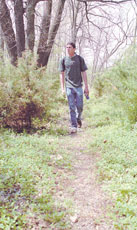Biology department continues salvaging pond, nature trail

Chris Crabtree, senior biology major, walks down the new trail near the Biology Pond.
Students in the Biology Club are engaging in activities to restore a nature trail at Missouri Southern’s Biology Pond.
The pond is located behind Matthews Hall at the west end of campus.
Kip Heth, assistant professor of biology, specializing in aquatic ecology, is one of three faculty sponsors of the Biology Club.
“General biology students go to the pond once a semester, the zoology class has a research project that generally involves the pond or Turkey Creek,” Heth said.
Dr. Dorothy Bay, associate professor of biology, is also involved with the club’s efforts to restore the pond.
“We are cleaning it up, removing trash, and also cutting out exotic species that are invading and killing our native plants we want growing there,” Bay said.
Bay said honeysuckle is among the worst of the invaders.
Although a native to the area, honeysuckle will grow too much and take over.
The multi-flora rose, an Asian species, is another of Bay’s concerns.
“They were brought in as a natural fence, but it got all over the woodlands and prairie pastures,” Bay said.
“If you let crop fields go fallow for a season, the multi-flora rose will take there as well, and the thorns are strong enough to puncture a tractor tire.”
As active as she may be with the efforts of the Biology Club, Bay defers to one of her students for originating the project.
“Chris [Crabtree] came up with the idea of having students volunteer on campus instead of paying dues,” Bay said.
Students are asked to put in time at one of several cleanup projects. Crabtree, senior biology major, is the president of the Biology Club.
“We tried to come up with things to do on campus,” Crabtree said.
Students are restoring more than the Biology Pond. The club has students cleaning up Turkey Creek and the College’s prairie patch just east of the residence halls.
The Biology Club is also planning a trip to the zoo for the end of April. Dr. Scott Wells, head of the biology department, has also taken notice of the group’s work.
“One half to two thirds of the trail have been mulched,” Wells said.
The club receives mulch donated by the Joplin Recycling Center.
“Storms knock down trees, and the city picks up the trees to make mulch,” Wells said.
Wells said earlier in the semester a group of students worked on the trail through cold weather, but still got much accomplished.
“I always try to accommodate groups like that,” he said.
The Biology Club is not restricted to biology majors. Anyone with an interest can join.
Your donation will support the student journalists of Missouri Southern State University. Your contribution will allow us to purchase equipment and cover our annual website hosting costs.



























